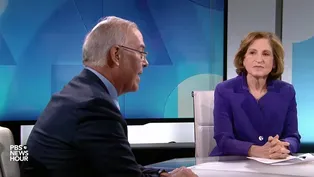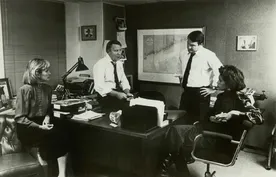
Renowned journalist, NewsHour co-founder Robert MacNeil dies
Clip: 4/12/2024 | 13m 2sVideo has Closed Captions
Renowned journalist and NewsHour co-founder Robert MacNeil dies at 93
Robert MacNeil died Friday morning at the age of 93. He was the visionary and driving force in the creation of the institution that, with Jim Lehrer, became the NewsHour. Jeffrey Brown looks back at his life and legacy.
Problems playing video? | Closed Captioning Feedback
Problems playing video? | Closed Captioning Feedback
Major corporate funding for the PBS News Hour is provided by BDO, BNSF, Consumer Cellular, American Cruise Lines, and Raymond James. Funding for the PBS NewsHour Weekend is provided by...

Renowned journalist, NewsHour co-founder Robert MacNeil dies
Clip: 4/12/2024 | 13m 2sVideo has Closed Captions
Robert MacNeil died Friday morning at the age of 93. He was the visionary and driving force in the creation of the institution that, with Jim Lehrer, became the NewsHour. Jeffrey Brown looks back at his life and legacy.
Problems playing video? | Closed Captioning Feedback
How to Watch PBS News Hour
PBS News Hour is available to stream on pbs.org and the free PBS App, available on iPhone, Apple TV, Android TV, Android smartphones, Amazon Fire TV, Amazon Fire Tablet, Roku, Samsung Smart TV, and Vizio.
Providing Support for PBS.org
Learn Moreabout PBS online sponsorshipGEOFF BENNETT: Sadly, tonight, we remember our co-founder and longtime co-anchor Robert MacNeil.
His partnership with his close friend Jim Lehrer, who died in 2020, led to the creation of this program you're watching today.
MacNeil died early this morning at the age of 93.
Jeffrey Brown looks back at his life and many contributions.
ROBERT MACNEIL, Co-Founder and Former Anchor, "PBS NewsHour": What actions or deeds are you prepared to make to improve relations between Cuba and the United States?
JEFFREY BROWN: Robert MacNeil had a knack for being where the action was.
He covered major stories around the world and titled his 1982 memoir "The Right Place at the Right Time."
ROBERT MACNEIL: I am a wordsmith.
That is my trade is using words, either writing them or speaking them.
JEFFREY BROWN: He was lifelong lover of language, literature and the arts, who called himself, in a later memoir, "Wordstruck."
And he was the visionary and driving force in the creation of the institution that, with Jim Lehrer, became the "NewsHour."
JIM LEHRER, Co-Founder and Former Anchor, "PBS NewsHour": First, tell the story about how all this happened.
JEFFREY BROWN: In 2000, he described their approach this way: ROBERT MACNEIL: Fundamental fairness and objectivity, and also the idea that the American public is smarter than they're often given credit for on television, and they don't all need things in little bite-sized, candy-sized McNuggets of news.
How could we add a kind of respect for complexity to the news that was already there?
And, really, that's how our concept was born.
JEFFREY BROWN: Robert MacNeil, known to his friends as Robin, was born in Montreal and raised in Halifax, Nova Scotia.
His Canadian roots would remain important to him throughout his life.
And he spent part of his summers at a home by the sea.
That love of the sea came from his parents, his father, Robert, a lieutenant commander in the Royal Canadian Navy during World War II and later a Canadian Foreign Service officer, his mother, Margaret, who also instilled in him his love of poetry and language.
He set out first to be an actor, but after graduating from Carleton University in Ottawa, turned to journalism.
He worked for Reuters and NBC News, first in London, later based in Washington.
He covered the assassination of John F. Kennedy in Dallas, even reporting live by phone from inside the Texas School Book Depository, where he may have run into Lee Harvey Oswald.
ROBERT MACNEIL: I heard that this guy called Oswald had been arrested who worked at the book depository.
And I said, isn't that odd?
That's the building I went into.
God, he must have been coming out about the time I went in.
JEFFREY BROWN: For NBC and later the BBC, he would cover a wide range of stories both abroad and at home, here in 1963 on "Meet the Press" talking with civil rights leaders Martin Luther King Jr. and Roy Wilkins.
Robins connection to PBS began in 1971, when he was hired to co-anchor NPACT, the National Public Affairs Center for Television, at the time, public broadcasting's unit in Washington responsible for news-related programming.
ROBERT MACNEIL: Butterfield revealed that all of President Nixon's conversations in his two White House offices have been tape recorded for the past two years.
ANNOUNCER: From Washington... JEFFREY BROWN: The breakthrough for Robin and the future of news on PBS came with the 1973 gavel-to-gavel prime-time coverage of the Senate Watergate hearings.
ROBERT MACNEIL: So, the ultimate question, how high do the scandals reach and was President Nixon himself involved?
JEFFREY BROWN: It was here that MacNeil was first teamed up with Lehrer, Jim Lehrer.
The two would also rebroadcast the hearings, with analysis, late into the night, some 250 hours in all.
I spoke with Robin and Jim on the 40th anniversary of the hearings.
ROBERT MACNEIL: Some of these things came out quite unexpectedly, in a very casual, almost offhand manner.
Everything is underlined nowadays.
Everything has arrows pointing at it.
This is going to be a great day today, and we are likely to hear -- we didn't have any of that kind of buildup.
It's just the hearings spoke for themselves.
JEFFREY BROWN: The success of the coverage and the chemistry of the team led to the creation in 1975 of "The Robert MacNeil Report," with Jim Lehrer first as its Washington correspondent, and soon a full partner in "The MacNeil/Lehrer Report."
In 2016, Robin and Jim looked back at their beginnings.
ROBERT MACNEIL: Many people in public television had thought we should be doing sophisticated entertainment and education and culture, and not journalism, not public affairs, because that would cause controversy and everything.
But our coverage of the Senate Watergate hearings, which clearly were a turning point in this country in all kinds of ways, got more and more people suddenly watching their public television stations and sending money to them.
That turned people's heads around in public television, and people began saying, well, you have become a team.
You should do a daily show.
JEFFREY BROWN: The transition to a full hour, "The MacNeil/Lehrer NewsHour," came in 1983.
It was a bold move, but very much in step with what Robin and Jim saw themselves doing from the beginning.
ROBERT MACNEIL: We ended up as an alternative.
And given the dozens of channels now that are doing something called news, from the serious to the comic, this is the one that has stayed absolutely gimmick-free, and, therefore, its uniqueness is more apparent now, I think, than it was when we started 30 years ago.
JEFFREY BROWN: The hourlong program became noted for its civil tone and the depth of its coverage.
ROBERT MACNEIL: Who are you afraid of in the region?
JEFFREY BROWN: Through the years, Robin conducted interviews with numerous world leaders.
ROBERT MACNEIL: I would like to grope a little further.
MARGARET THATCHER, British Prime Minister: Oh, grope away.
JEFFREY BROWN: At home, he explored a wide array of issues of the day.
ROBERT MACNEIL: We lead tonight with a look at teenagers and the AIDS epidemic.
Still to come on the "NewsHour": what's ahead in Bosnia; and rethinking affirmative action JEFFREY BROWN: And Robin insisted on the importance of including the arts in the "NewsHour"'s reporting.
He regularly talked with writers and other artists in this country and abroad.
The MacNeil-Lehrer team gained honors, viewers, and the attention of cartoonists.
A 1981 "Doonesbury" cartoon had Robin saying: "I'll be asking smooth, urbane questions from New York.
Jim Lehrer will handle the earnest, plainspoken questions from Washington -- Jim."
And "The New Yorker" poked fun at the way the two were occasionally mixed up by viewers.
"I never knew who was who until the other one left."
ROBERT MACNEIL: A lot of people think there's a MacLehrer out there.
But, anyway... BIG BIRD, "Sesame Street": Hi there, Mr. McNulty.
ROBERT MACNEIL: That's MacNeil.
BIG BIRD: Oh, sorry.
JEFFREY BROWN: The pair also enjoyed being part of the public television family, including the gang on "Sesame Street," which Robin visited to interview a certain well-known Grouch.
ROBERT MACNEIL: Our cameras are on "Sesame Street" where Oscar the Grouch is ready, willing and crazy to talk to us.
I see that you are in the ice cream business.
OSCAR THE GROUCH, "Sesame Street": Oh, did you figure that out all by yourself, or did Lehrer help you?
(LAUGHTER) JEFFREY BROWN: Even while co-anchoring the nightly program, Robin took on other projects, especially focused on his passion for language.
His 1986 round-the-world nine-part series "The Story of English" broadcast on PBS and the BBC explored the history and development of the language.
ROBERT MACNEIL: We are setting out on a journey to see what is happening to English.
JEFFREY BROWN: Later came a sequel on the richness of language in this country, "Do You Speak American?"
He and I talked about it in 2005.
ROBERT MACNEIL: There is nothing more enjoyable than going around the country and just talking to people.
I have always been fascinated by how differently people talk and the humor in that and the sense of personality that comes from that and the sense of local identity.
So it was really fun.
JEFFREY BROWN: He was also pursuing his own writing, nonfiction first.
But, in 1995 he decided to step away from daily journalism to focus on writing fiction and to work on other projects.
His first novel, "Burden of Desire," followed the impact of the famous World War I explosion in Halifax Harbor on the lives of his fictional characters.
Other novels would follow.
As Robin made his last appearance in the anchor chair, his longtime partner and close friend had this to say.
JIM LEHRER: He's leaving permanent tracks along the way he traveled and worked and created.
They are tracks of courage to do what he knew to be right and to actually do it right, and to do it with grace and class and with good humor.
(WHISTLING) JIM LEHRER: Hey, Robin.
ROBERT MACNEIL: I guess that is it.
JIM LEHRER: Yes.
Hey, good night.
JEFFREY BROWN: Robin remained involved with the "NewsHour."
He and Jim headed MacNeil/Lehrer Productions, which owned the program until 2014.
And in addition to writing, he pursued other projects.
Continuing his deep connection to the arts, he served as chairman of the MacDowell Artist Colony in New Hampshire for 17 years.
He and I spoke there in 2007 during MacDowell's centennial celebration.
ROBERT MACNEIL: The real importance of art is that it is the greatest expression of American ideal of freedom.
Artists are intellectually and creatively freer than anybody.
JEFFREY BROWN: And your sense is that that understanding of the role of art as expressing American freedom has been lost, diminished?
ROBERT MACNEIL: I don't know whether it is seen as acutely in the public consciousness.
Winston Churchill said back in the late '40s, the empires of the future are going to be empires of the mind.
And so much of what this country, the face that this country presents to the world is the face that expresses its ideas and its ideals.
JEFFREY BROWN: He also continued to make documentaries, including the 2007 PBS series "America at a Crossroads" about the war on terror and a 2011 series for the "NewsHour" titled "Autism Now," a very personal project that included the story of his grandson, Nick.
In 1997, Robin became an American citizen and wrote of the love he'd come to feel for his adopted land in the last of his three memoirs, "Looking for My Country."
He spoke of it in 2003 on C-SPAN.
ROBERT MACNEIL: All the years I was becoming embedded, so to speak, in this country, literally and figuratively, I -- and living through all the traumas of America, both personally with -- alongside Americans and covering them as a journalist, there was, in my being, a disconnect between the country I inhabited and the country that inhabited me.
I was a man with a nationality, but without a psychic country, so to speak.
JEFFREY BROWN: He was a fellow of the American Academy of Arts and Sciences and gained many honors over the years, including, with Jim, induction into the Television Academy Hall of Fame in 1999.
ROBERT MACNEIL: We demonstrated that we could do it in a different and more comprehensive and analytical way, and, suddenly, the argument had been won over whether there was a role for public broadcasting in this area.
JEFFREY BROWN: Robert MacNeil is remembered by those of us who worked with him with respect, gratitude, and love.
He was an extraordinary man who helped guide millions through extraordinary times with his intelligent, passionate, and humane journalism.
He had this to say when he signed off from the "NewsHour" in 1995.
ROBERT MACNEIL: ...
I could be proud of when I went home every night.
But that applies equally to our viewers.
Without you, no program.
There are now some five million of you a night, and you express a loyalty to this program of a quality I have never experienced anywhere else.
Thank you for understanding what we do.
You will find all the same values there on Monday night and in the years ahead.
Thanks, and good night.
GEOFF BENNETT: Robert MacNeil was married for 30 years to Donna MacNeil, who died in 2015.
He had four children, Cathy, Ian, Alison and Will, and five grandchildren.
Brooks and Marcus on abortion restrictions motivating voters
Video has Closed Captions
Clip: 4/12/2024 | 10m 40s | Brooks and Marcus on how abortion restrictions could motivate voters in November (10m 40s)
Israel awaits possible retaliatory attack from Iran
Video has Closed Captions
Clip: 4/12/2024 | 4m 43s | Israel awaits possible retaliatory attack from Iran and proxy forces (4m 43s)
Robert MacNeil's colleagues remember his life and legacy
Video has Closed Captions
Clip: 4/12/2024 | 9m 6s | Robert MacNeil's colleagues and friends remember his life and legacy (9m 6s)
What to expect when Trump's 1st criminal trial begins Monday
Video has Closed Captions
Clip: 4/12/2024 | 7m 26s | What to expect when Trump's 1st criminal trial begins Monday (7m 26s)
Providing Support for PBS.org
Learn Moreabout PBS online sponsorshipSupport for PBS provided by:
Major corporate funding for the PBS News Hour is provided by BDO, BNSF, Consumer Cellular, American Cruise Lines, and Raymond James. Funding for the PBS NewsHour Weekend is provided by...















